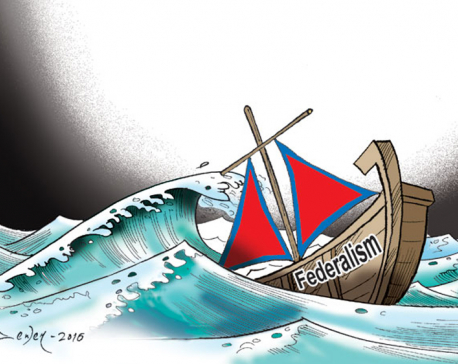
OR
Shyam Sharan’s punitive prescriptions: Perils to Nepal-India relations
Published On: August 31, 2020 04:00 PM NPT By: Babu Krishna Karki


Babu Krishna Karki
The author is Brigadier General (Retired) of Nepal Army. Views are personal.news@myrepublica.com
Irrespective of how putrid the Oli led government maybe for its excesses, the Nepali people will stand unwaveringly united and support the government over the border dispute with India. Any sinister attempt to wedge a divide is bound to fuel more resentment.
"After terminally poisoning Nepal-India relations, he has re-surfaced from his pit to spew venom again. This could potentially derail the rapprochement because it will likely poison public sentiments on both sides.” These were the apprehensive remarks expressed by a senior former Nepali diplomat after reading the recent op-ed piece by India’s former foreign Secretary Shyam Sharan that appeared in The Hindu last week.
Sharan’s anti-Nepal proclivity has been well known to both sides of the aisle. But what is startling is the timing and the spiteful manner in which he offers punitive policy prescriptions to the India’s ruling establishment.
The relationship between India and Nepal had nosedived after India inaugurated a road via Lipulek pass—a territory Nepal claims as its own. Nepal immediately protested and responded decisively after India kept snubbing Nepal’s offers for dialogue. It swiftly passed a new map comprising of disputed territories and got it unanimously endorsed by both houses of the parliament. Nepal’s rushed cartographic correction came as rude shock to India. Following that, India maintained an irresponsive posture and remained eerily reticent.
Amidst the gloom, a glimmer of hope appeared on the horizon after Nepal’s Prime Minister KP Oli called his Indian counterpart to extend greetings on India’s Independence Day. Reportedly, they spoke for 11 minutes and they agreed to resume diplomatic engagement to settle the prickly disputes bedeviling the two countries. Following their conversation, the Indian Ambassador rushed to Delhi for necessary consultations and facilitate arrangements for further dialogues.
Spiteful spew
Amidst this thawing of relations, however, Sharan struck with a vengeance. From his spiteful prescriptions, it is obvious that he is hell-bent on sabotaging the impending dialogues.
Sharan’s first argument exhorts India to reject Nepal’s territorial claims but do all to nurture the Nepali people’s goodwill. This is a self-contradictory and absurd guidance for several reasons. Nepali state is a sovereign entity and its government is a democratic representation of its people. By virtue of popular representation, the two simply cannot be disassociated.
The presumption that India can garner the people’s goodwill while ignoring the state is utterly delusional and laughable. It was the Nepali populace that provided a thumping majority to the Oli-led NCP party for its uncompromising stance against India during the India imposed inhumane blockade in 2015. It was actually the Nepali people again that coerced the Oli led government to take another firm stance and make the necessary cartographic corrections. Even those political forces reckoned to be “assets” of India could not dare to oppose the overwhelming pubic desire and had to concede and support the government.

Students demonstrating in Kathmandu protesting against the political map unveiled by India showing the Nepali territories including Kalapani inside India in November, 2019.
Irrespective of how putrid the Oli led government maybe for its excesses, the Nepali people will stand unwaveringly united and support the government over the border dispute with India. Thus, any sinister attempt to wedge a divide is bound to fuel even more resentment.
Second, Sharan dumps all the blame on Nepal for taking a series of unilateral actions and for brazenly staking a claim to a large wedge of Indian territory. Sharan knows very well that the border disputes have remained a longstanding irritant and yet he slyly skirts the issue. The situation only flared after India published a controversial map in November 2019 which included the disputed territories. Besides Nepal, even its other nuclear neighbors China and Pakistan flatly rejected the map.
It was India that further fueled the situation by constructing a road in the disputed territory and had its Defense Minister triumphantly inaugurate it virtually earlier this year. It was only after India snubbed all of Nepal’s offers for dialogue that Nepal resorted to an assertive cartographic correction.
Most importantly, it is inconceivable that a tinier landlocked country that is hugely dependent on India for its supplies would have the audacity to claim territory of a nuclear power like India. India’s muted response to Nepal’s undaunted claim is telling. The claim sounds even more ridiculous when close to 70,000 Nepali nationals are serving in India’s various armed forces and are ready to lay down their lives to protect every inch of Indian territory.
Sharan further blames Nepal for unilaterally altering the borders he claims had been accepted by both sides for more than 100 years. There was no current form of India 100 years ago. The British East India Company was the overlord of the entire landmass that currently makes up Pakistan, India and Bangladesh. As highlighted by Sharan, a treaty that Nepal signed with that overlord called the Sugauli Treaty of 1816 clearly stipulates that land east of the Kali River is Nepalese territory. Although Sharan claims that there was no map appended to the treaty, the river that demarcates the border has remained unaltered ever since and Nepal is open to any neutral third-party attempt at ascertaining the source of the Kali River.
Sharan has forwarded the most untenable and dishonorable proposition to be ever forwarded by a former Indian foreign secretary by insinuating that since Nepal did not lay claim, India can squat by taking advantage of the open-border provision. The manner in which Hong-Kong was handed back to China by the Brits after 156 years of occupation should serve to nullify Sharan’s petulant claim. China occupied and India claimed territory of Askai Chin should also serve as a sobering reminder.
Sharan’s most depraved and incendiary allegation, however, is that he accuses Nepal of being a historical abettor that suppressed India’s independent aspirations. By invoking such historical antecedents, Sharan has stooped to a whole new level of petulance and perversity. In an attempt to depict Nepal as complicit, he claims Nepal sent troops to assist the East India Company and mercilessly killed India’s freedom fighters. He further asserts that Nepal received a chunk of land “Naya Muluk” for that assistance. He then makes a pitiful demand of restitution.
He, however, glaringly omits to tell his audience about Nepal’s unrivaled contributions to India and masks India’s excesses against Nepal. By all accounts, Nepal remains the largest contributor to India’s security and economics. Plus, Nepali troops were sent by Nepal’s then autocratic Rana regime and that too to safeguard their regime from the juggernaut that had subjugated the entire Indian peninsula except Nepal.
Even though India had intentionally harbored all of Nepal’s anti-establishment forces including the then Maoist terrorists, Nepal never labelled India or for that matter Sharan and his cohorts as supporters of terrorism. In fact, the then American Ambassador’s cable leaked by Wikileaks clearly implicates India for harboring Maoist terrorists and also indicts Sharan for being a willful participant to the ploy but feigning ignorance when confronted about the issue. Also, Nepal is not staking punitive damage claims for the cumulative 39 months of blockade India has imposed on Nepal since 1947. Nepal is neither seeking due compensation for the blood spilled by Nepali nationals on behalf of Indian Armed services while protecting India’s sovereignty and territorial integrity.
In fact, history cannot be reversed. But, if restitution is the way forward then it would be welcome for Nepal because it would re-acquire an enormous landmass lost out to the East India Company in exchange for the “Naya Muluk.”
Sequestering squirming Sams and spoiler Sharans
Today, most believe the current bilateral feud is a result of the blockade imposed by Modi government in 2015. The blockade certainly exacerbated the situation but the origin actually precedes Modi’s arrival. The seed of discord was actually sown by Shyam Sharan and his cohorts through the ill-crafted 12-point agreement signed back in 2005 by representatives of seven Nepali political parties and the Maoists (who were still branded as terrorists) in the dark corners of Delhi simply to sideline Nepal’s monarchy.
Why was the 12-point agreement detrimental to both countries? First, it was borne from Sharan’s personal vengeance than from prudence or India’s policy imperatives. Sharan—the chief architect of the agreement was furious at Nepal’s Rajah who had snubbed his repeated requests for audience, when finally granted was made to wait for an hour and later when he accompanied India’s special envoy Dr Karan Singh was not allowed to join the conversation.
Second, by sidelining the Monarchy, Sharan opened the floodgates for the Chinese ingress into Nepal. Until Monarchy was around, Chinese intrusion and influence was negligible. Sharan and his cabal are culpable for China’s current irresistible grip on Nepal. More ominously, anti-India elements have piggybacked on Chinese influence and increased their own operational space in the southern plains bordering India.
Third, Nepal’s intelligence apparatus had reportedly assessed that Sharan and Shiv Shankar Mukherjee were heavily swayed by the ecclesiastical missions that saw Nepal as a lush grazing pasture. Nepal endured an exponential spike in proselytization immediately following the 12-point agreement. That culminated in Nepal’s Hindu identity being suddenly erased by the interim constitution in 2007 without any rigorous debate or deliberation. These facts confirm that such a fateful scheme could not have been executed without the knowledge and consent of the kingmakers in Delhi.
Fourth, this agreement was the precursor to Nepal’s peace process. It was inherently flawed from the very onset. Nepal’s protracted instability can be directly attributed to the faulty intent and design of Nepal’s peace process. The process totally proscribed one of the primary protagonists of the conflict—the Monarchy and Nepalese Army. The process only accommodated the signatories of the 12-point agreement and excluded the Monarchy and Army completely. The rising clamor for the return of Monarchy now is also because of that dastardly exclusion.
Fifth, when Maoists turned their back on India immediately after ascending to power, Shyam Sharan is perceived to have hastily instigated a secessionist movement in Tarai as a countermeasure. He reportedly spear-headed a campaign to disunite Madheshi politicians from all major political parties and cobbled a Madheshi alliance.
Sharan’s erratic and vengeful plots in Nepal have inflicted an irreparable damage to both countries. Although he professed and projected it as a perfect policy, in hindsight, it was utterly myopic and treacherous. Today, Nepal is reeling from endless political instability, impunity, and injustice greatly as a result of that malice infested plot. India’s security interests are in peril because Nepal has irreversibly strayed from its sphere of influence and has become a hotbed of anti-India sentiment and activity. Things turned out differently as they often do, not just because the circumstances changed but mainly because the prime characters made horrible choices.
The indefatigable propensity of likes of Sharan to employ their biased prism peepholes to influence policy is evident through such punitive prescriptions. Therefore, both sides should be extremely cautious of spoilers with malicious agendas that are bent on decimating the bilateral relations. India in particular should be warier of heeding to the antiquated flops like SD Muni, Ashok Mehta, Sitaram Yechuri, Shiv Shankar Menon and Shyam Sharan. Both sides should not be bedazzled by the senile pirouettes of these characters squirming to prove their salience and sagacity.
The imperative for a new departure in Nepal-India relations is urgent. That, however, should be devoid of such of bellicose affirmations that rile up resentment and recriminations on both sides. In earnest, both sides do seem to have a genuine interest in strengthening relations because India-Nepal bond is too vital and too intimate to remain stagnant and spoiled by inflated egos and by spiteful characters like Shyam Sharan.
The author is Brigadier General (Retired) of Nepal Army. Views are personal.
You May Like This

Why Federalism has Become Risky for Nepalese Democracy
The question arises, do federal or unitary systems promote better social, political and economic outcomes? Within three broad policy areas—political... Read More...

Nepal's Forests in Flames: Echoes of Urgency and Hopeful Solutions
With the onset of the dry season, Nepal's forests undergo a transition from carbon sinks to carbon sources, emitting significant... Read More...

'Victim blaming'- Nepali society's response to sexual violence
Multiple studies show that in most sexual assaults, the attacker is someone known and trusted by the victim. ... Read More...




Just In
- Govt receives 1,658 proposals for startup loans; Minimum of 50 points required for eligibility
- Unified Socialist leader Sodari appointed Sudurpaschim CM
- One Nepali dies in UAE flood
- Madhesh Province CM Yadav expands cabinet
- 12-hour OPD service at Damauli Hospital from Thursday
- Lawmaker Dr Sharma provides Rs 2 million to children's hospital
- BFIs' lending to private sector increases by only 4.3 percent to Rs 5.087 trillion in first eight months of current FY
- NEPSE nosedives 19.56 points; daily turnover falls to Rs 2.09 billion















Leave A Comment